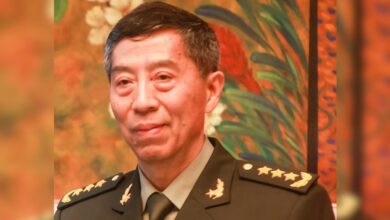The Iranian Armed Forces are appreciated by Iran’s Supreme Leader Ayatollah Ali Khamenei for their attack on Israel
Tehran: Ayatollah Ali Khamenei, the supreme leader of Iran, disregarded any debate on Sunday on the effectiveness of Tehran’s historic drone and missile strike on Israel, implying that even if a massive offensive was launched, not all of the missiles reached their intended objectives.

Even though Iran’s air defenses opened fire and most of the country’s commercial planes were grounded, Khamenei made no mention of the alleged Israeli reprisal attack on Friday on the central city of Isfahan in his remarks to top military officers.
According to analysts, while the Israel-Hamas conflict in the Gaza Strip rages on and inflames the broader area, both Iran and Israel, the region’s archrivals involved in a shadow war for years, are attempting to defuse tensions after a string of escalating strikes between them.
The upper echelons of Iran’s regular military, police, and paramilitary Revolutionary Guard—a powerful force inside its Shiite theocracy—were present at Khamenei’s meeting when he made the remarks, which are 85 years old.
In statements broadcast on state television, Khamenei said, “Debates by the other party about how many missiles were fired, how many hit the target and how many didn’t are of secondary importance.”
The primary concern is the rise of the Iranian people and the determination of the Iranian military in a significant international arena. What counts is this. In an attempt to overwhelm Israel’s air defenses, Iran launched hundreds of drones, ballistic missiles, and cruise missiles on April 13. This was the first foreign strike on Israel since Saddam Hussein, the dictator of Iraq, fired Scud missiles at Israel during the Gulf War in 1991.
Nonetheless, the bulk of the incoming fire was shot down by Israeli fighter planes and air defense systems, which were supported by the United States, the United Kingdom, and neighboring Jordan.
The Iranian strike at the Nevatim air base in southern Israel only caused little damage, according to satellite photographs evaluated by The Associated Press on Saturday. One taxiway was severely damaged, but Israel swiftly repaired it.
Iran launched its assault in retaliation for an alleged Israeli strike that killed two Guard generals and others on April 1st, hitting a consular facility close to the Iranian Embassy in Damascus, Syria.
Despite widespread outrage about Iran’s economy and crackdowns on dissent, Khamenei said, “Today, thanks to the work done by our armed forces, the Revolutionary Guard, the army, and the police, each in its own way, praise be to Allah, the image of the country around the world has become commendable.”
In other news, Iraq’s Security Media Cell said that security forces in the western province of Nineveh were hunting for “outlaw elements” who had launched missiles into Syria late on Sunday, targeting a facility used by coalition troops commanded by the United States.
The statement also said that the searches had discovered and destroyed a missile launcher.
At first, no organization took credit for the alleged assault.
About five missiles were fired over the border, according to Maj. Gen. Tahseen al-Khafaji, director of the Security Media Cell, although it was unclear whether they struck or damaged any property at the intended facility.
US officials did not immediately respond to a request for comment.
Two nights before, an explosion rocked an Iraqi camp of the Popular Mobilization Forces, an alliance of militias backed by Iran, leaving one person dead and eight injured.
At first, militia representatives characterized the explosion at the military post Kalsu, located north of Babylon, as an airstrike that they attributed to American troops. According to Iraq’s Security Media Cell, the nation’s air defense command had not seen any drones or jets near Babylon before or during the explosion, while the U.S. Central Command denied conducting any attacks in the country.
Within the Iraqi military, the PMF is recognized as an “independent military formation.”
Some of the coalition’s member organizations have carried out assaults against American personnel stationed in the area in recent months, claiming it was in revenge for Washington’s backing of Israel in its conflict with Hamas in Gaza. Following the deaths of three American troops in an assault on a facility in Jordan close to the Syrian border in late January, which prompted American retaliation strikes in Iraq, the attacks came to an end.







